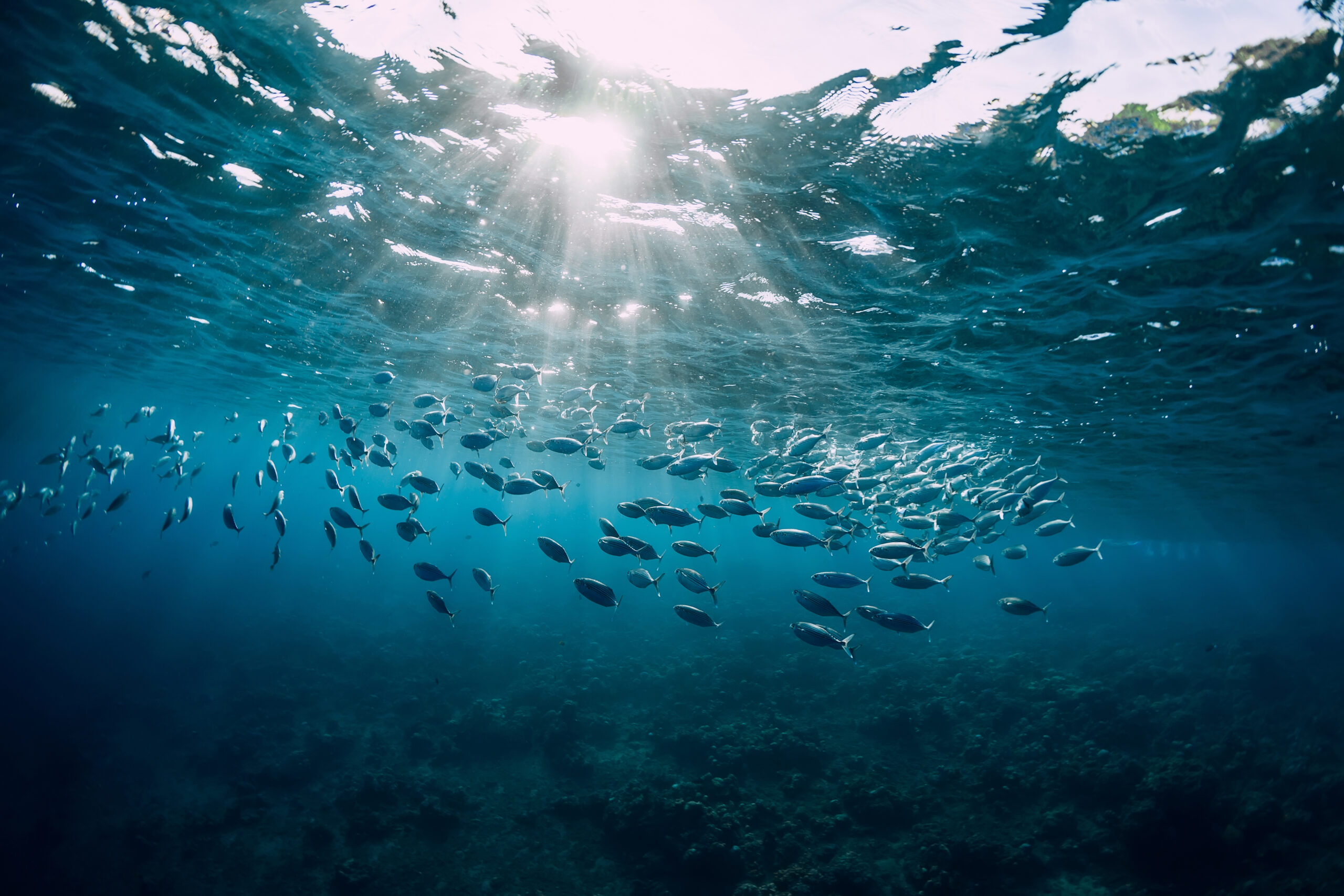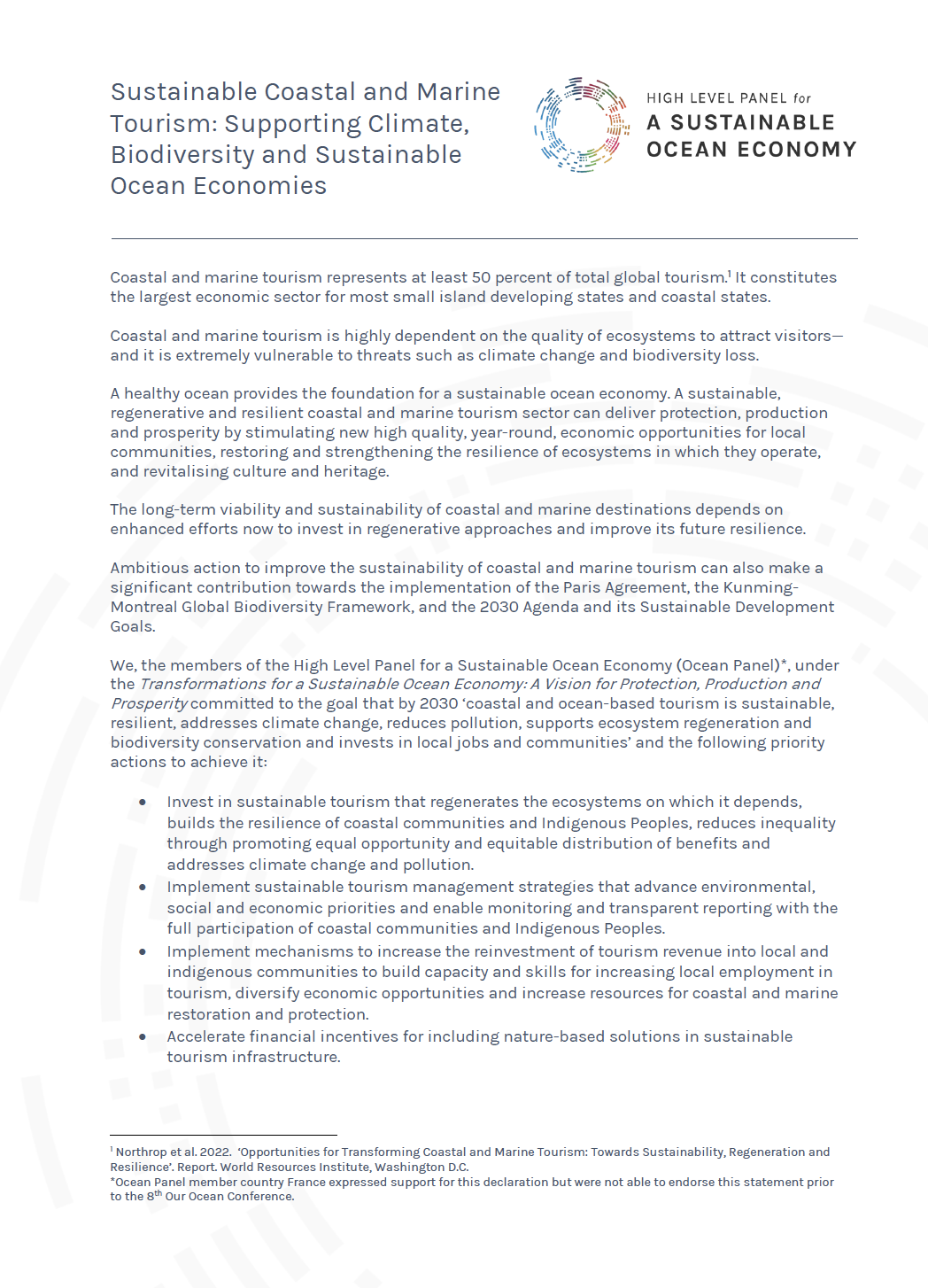Le tourisme côtier et marin représente au moins 50 % du tourisme mondial total.1 Il constitue le secteur économique le plus important pour la plupart des petits États insulaires en développement et des États côtiers.
Le tourisme côtier et marin dépend fortement de la qualité des écosystèmes pour attirer les visiteurs, et il est extrêmement vulnérable aux menaces telles que le changement climatique et la perte de biodiversité.
Un océan en bonne santé constitue la base d'une économie océanique durable. Un secteur du tourisme côtier et marin durable, régénérateur et résilient peut assurer la protection, la production et la prospérité en stimulant de nouvelles opportunités économiques de haute qualité, tout au long de l'année, pour les communautés locales, en restaurant et en renforçant la résilience des écosystèmes dans lesquels elles opèrent, et en revitalisant la culture et patrimoine.
La viabilité et la durabilité à long terme des destinations côtières et marines dépendent d'efforts accrus maintenant pour investir dans des approches régénératrices et améliorer leur résilience future.
Des actions ambitieuses pour améliorer la durabilité du tourisme côtier et marin peuvent également apporter une contribution significative à la mise en œuvre de l'Accord de Paris, du Cadre mondial pour la biodiversité de Kunming-Montréal, de l'Agenda 2030 et de ses Objectifs de développement durable.
Nous, les membres du Groupe de haut niveau pour une économie océanique durable (Ocean Panel)*, sous la Transformations pour une économie océanique durable : une vision pour la protection, la production et la prospérité engagé dans l'objectif que d'ici 2030 "le tourisme côtier et océanique soit durable, résilient, s'attaque au changement climatique, réduise la pollution, soutienne la régénération des écosystèmes et la conservation de la biodiversité et investisse dans les emplois et les communautés locales" et les actions prioritaires suivantes pour y parvenir :
- Investir dans un tourisme durable qui régénère les écosystèmes dont il dépend, renforce la résilience des communautés côtières et des peuples autochtones, réduit les inégalités en promouvant l'égalité des chances et la répartition équitable des avantages et s'attaque au changement climatique et à la pollution.
- Mettre en œuvre des stratégies de gestion du tourisme durable qui font progresser les priorités environnementales, sociales et économiques et permettent un suivi et des rapports transparents avec la pleine participation des communautés côtières et des peuples autochtones.
- Mettre en œuvre des mécanismes pour augmenter le réinvestissement des revenus du tourisme dans les communautés locales et autochtones afin de renforcer les capacités et les compétences pour augmenter l'emploi local dans le tourisme, diversifier les opportunités économiques et augmenter les ressources pour la restauration et la protection côtières et marines.
- Accélérer les incitations financières pour inclure des solutions basées sur la nature dans les infrastructures touristiques durables.
- Investir dans les infrastructures d'assainissement et de traitement des eaux usées pour le tourisme côtier et marin afin d'améliorer la santé des communautés côtières et de réduire les impacts sur les écosystèmes côtiers et marins.
Pour soutenir une accélération des progrès sur ces actions prioritaires, le Groupe a commandé un rapport d'expert sur le tourisme océanique, Opportunités de transformation du tourisme côtier et marin : vers la durabilité, la régénération et la résilience. En tant que membres de l'Ocean Panel, nous appelons les gouvernements et les acteurs du secteur du tourisme marin et côtier à promouvoir :
- Plus de coopération et de collaboration. Tout le monde dans le secteur du tourisme a un rôle à jouer, notamment en soutenant de véritables partenariats qui offrent des opportunités de leadership aux communautés locales.
- Une place à table. Veiller à ce que le tourisme soit intégré aux programmes océaniques, climatiques et de biodiversité et aux plateformes internationales pertinentes.
- Agir contre le changement climatique. Accélérer les efforts pour réduire les émissions dans le secteur du tourisme et s'aligner sur l'objectif de température de l'Accord de Paris et maintenir à portée de 1,5oC limiter l'augmentation de la température, notamment grâce à la collaboration avec les pays et les acteurs et initiatives non étatiques concernés, comme la Déclaration de Glasgow sur l'action climatique dans le tourisme.
- Tourisme positif pour la nature. Utiliser des solutions basées sur la nature pour améliorer la résilience du tourisme côtier et marin et assurer l'alignement avec le Cadre mondial de la biodiversité de Kunming-Montréal.
- Des investissements pour accompagner la transformation. Pour financer une transformation positive du tourisme, les structures financières et incitatives existantes devront être révisées et de nombreuses destinations auront besoin de nouveaux mécanismes financiers innovants et durables, y compris le financement mixte.
| Anthony Albanais
Premier ministre d'Australie
|
William Samoei Ruto
Président du Kenya |
| Justin Trudeau
Premier ministre du Canada
|
Andrés Manuel Lopez Obrador
Président du Mexique |
| Gabriel Boric
Président du Chili
|
Hage G. Geingob Président de la Namibie |
| Sitiveni Rabuka
Premier ministre des Fidji
|
Jonas Gahr Store
Premier ministre de Norvège |
| Nana Addo Dankwa Akufo-Addo
Président du Ghana
|
Surangel Whipps, Jr.
Président des Palaos |
| Joko Widodo
Président de l'Indonésie
|
Antonio Costa
Premier ministre du Portugal |
| Andrew Michael Holness
Premier ministre de la Jamaïque
|
Rishi Sunak
Premier ministre du Royaume-Uni |
| Fumio Kishida
Premier ministre du Japon
|
Joseph R. Biden, Jr.
Président des États-Unis d'Amérique |


 Précédent
Précédent



